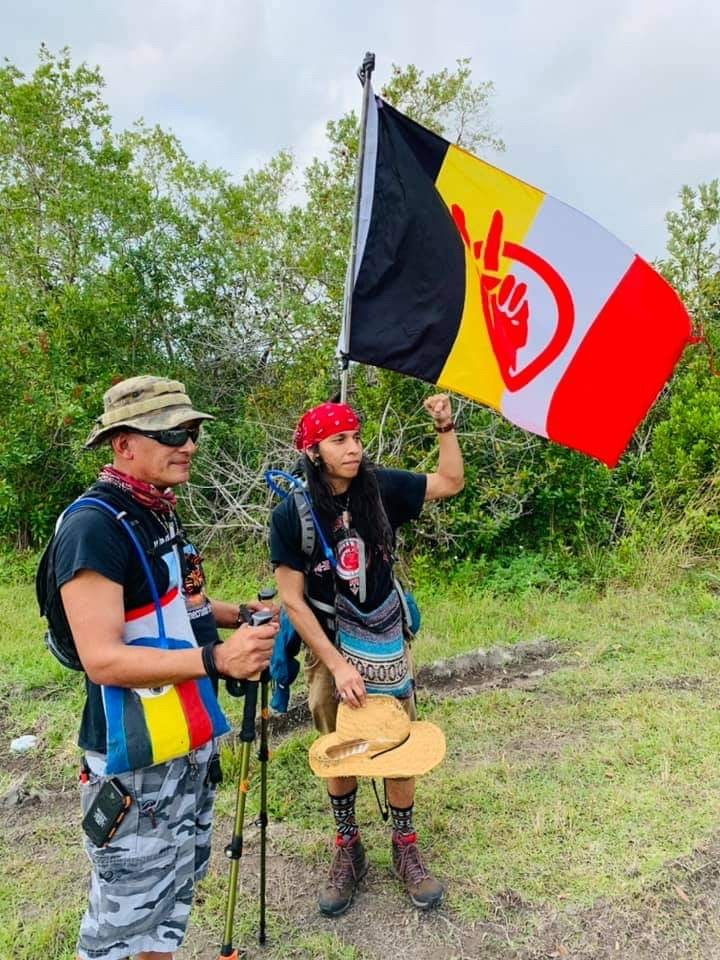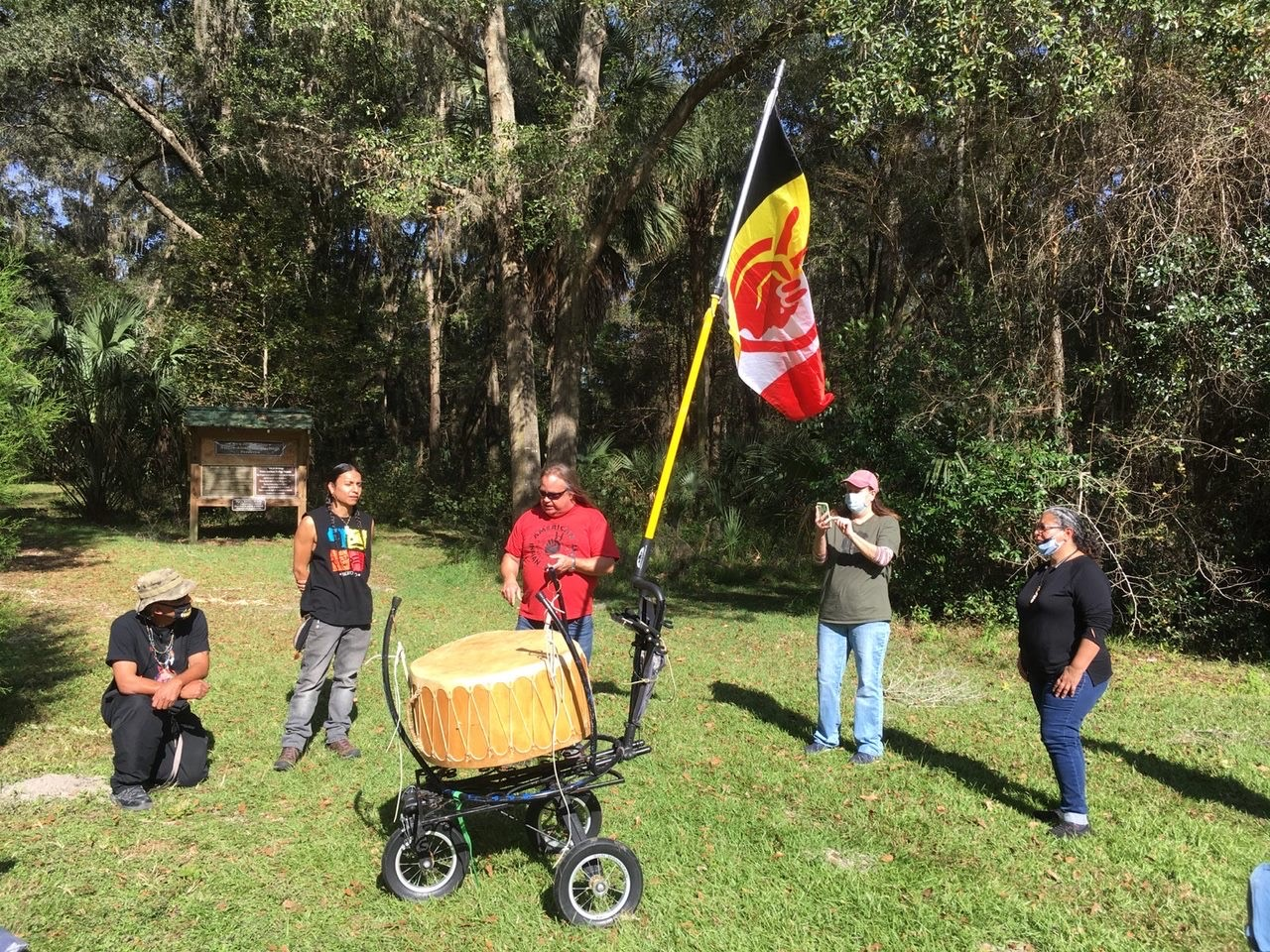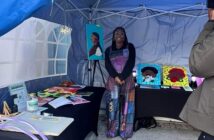By Mariana Navarrete, Arts & Culture Editor
Earth day is celebrated internationally on April 22. It is more than just an aesthetic day to post nature pictures on social media, and Florida based indigenous activist, Robert Rosa, suggested some key things we can do beyond Earth Day, and any other day to protect Earth.
Robert Rosa was born in New York. His people are from Boriken, what is called now Puerto Rico. He is Co-Chairman of Florida Indigenous Alliance (FIA).
The FIA is a non-profit organization of Indigenous peoples and allies working for the civil, human, natural, treaty, and sovereignty rights of the Indigenous peoples of the Western Hemisphere.
On Earth Day, people acknowledge the beautiful nature that we live in, but quite often forget how to take care of it daily.
“Earth day is every day for us,” Rosa said.
Rosa is also a Chairperson of the American Indian Movement FL chapter and member of the United Confederation for Taino People.

“On Earth Day, a lot of us [indigenous activists]get asked to speak about the important issues affecting our areas, our climate, fauna, air, and water” Rosa stated. “It is great when people welcome us to tell our stories on Earth Day giving us platforms.”
Beyond Earth Day, Rosa mentioned indigenous activists work daily to protect their territories and rights. For the organizations, he is part of there are four important S’s to follow: spirituality, sobriety, sovereignty, and support.
“Sobriety is a vital component. Colonialism brought a lot of trauma together with drugs and alcoholism to indigenous peoples.” Rosa emphasized. “We can’t be one with mother earth if we have intoxicated bodies.”
Indigenous’ activism to protect Earth has sometimes been not very well covered on the media, or not covered at all. Rosa highlighted the biggest fallacy of the media is telling us there is not a climate crisis.
“The majority of the media has made it almost a joke. It has been minimized and we all have been desensitized from natural and manmade weather catastrophes,” Rosa said.

There has been also a type of individualization of the climate crisis aiming to protect Earth suggesting individual actions like ditching plastic straws and recycling can help to decrease greenhouse emissions, discarding the fossil fuel industry we are dependent on.
Rosa discussed, “The recycling industry is not even very well regulated, and it depends per state and county, on how effective it is in the U.S. Plus, it is shipped to third world countries.”
Climate change is a collective problem that needs collective action. However, Rosa illustrated some individual actions in the community can move us toward the right path to achieving climate justice.
“It is up to the individual to learn a better way to understand and live in the old manners when you are thinking of the next seven generations,” Rosa said. “For example, people do not garden that much anymore. It only takes a little time each day to grow your own lettuce; food sovereignty is key.”
There is an ancient Iroquois philosophy that states that the decisions we make today should result in a sustainable world seven generations into the future, this is called The Seventh Generation Principle.
“What does my footprint here will do for the next seven generations? Is something we should all ask ourselves for the sake of Mother Earth,” Rosa said.
Bills and policies like the Clean Air Act, Clean Water Act, Endangered Species Act can enforce Earth protection. However, it takes a lot of human and collective action.
“None of these acts and policies are truly effective if not enforced without loopholes. In three years, we are going to be at the point of no return,” Rosa said.
Over 1,000 scientists from 25 different countries staged protests after the release of the Intergovernmental Panel on Climate Change’s (IPCC) new report. The report warned that rapid and deep cuts to greenhouse gas emissions are necessary by 2025 to avoid catastrophic climate effects.
“Present development challenges causing high vulnerability are influenced by historical and ongoing patterns of inequity such as colonialism, especially for many Indigenous people and local communities,” the IPCC report stated.
Anything preserved should be spoken or anything wanting to be done in a conservation area should be acknowledged by the local indigenous tribe and the whole community, because there are times the indigenous council with certain power follow other interests.
“Local Indigenous communities should have the last say because they know how to take care of it, as they have done it for thousands of years,” Rosa stated.
In order to achieve climate justice, Rosa stated that within the American Indian movement, they are going to protect their land by any means necessary.
“Our group is willing to go to the end of the world to protect Mother Earth,” Rosa highlighted.
With or without indigenous background it is vital to understand the climate crisis is an ongoing phenomenon that is taking strength if we do not take action.
Robert suggests multiple ways we can all take action:
- Make people aware through any platform you have and in any type of work you do
- Watch out for the laws being signed
- Vote people out who do not believe in climate change
- Vote people in who propose measures to protect the environment
- Get to know your local environmental organizations
- Get to know your nearest indigenous tribes and their efforts to achieve climate justice
- Teach children about climate change and Earth protection
This Earth Day on April 22, take a look at the local or national events giving indigenous, non-indigenous activists, and scientists platforms to voice out their stories and ways we can fix the climate crisis. All we have to do is listen and find ways to take action.





